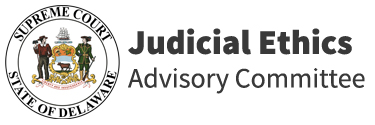Rules
Rules of the Judicial Ethics Advisory Committee
Two sets of rules govern the Judicial Ethics Advisory Committee: Rule 18 of the Court on the Judiciary (see below) establishes the Committee and its authority, and the Rules of the Judicial Ethics Advisory Committee provide more detail for the regulation of the Committee.
Rule 18. Judicial Ethics Advisory Committee.
(a) Membership. The Chief Justice shall appoint a Judicial Ethics Advisory Committee consisting of seven members. One member shall be appointed from each of the following courts: Court of Chancery; Superior Court; Family Court; Court of Common Pleas; and Justice of the Peace Court. No member of the Court on the Judiciary shall be appointed. The Chief Justice shall designate the chair, vice-chair and secretary. Members shall serve three-year terms; terms shall be staggered; and no individual shall serve for more than two consecutive terms. The Chief Justice shall designate a Justice of the Delaware Supreme Court to serve as the administrative liaison between the Court on the Judiciary and the Judicial Ethics Advisory Committee.
(b) Functions. The Judicial Ethics Advisory Committee shall have authority to:
(1) Express Opinions. At the request of a judicial officer, by the concurrence of a majority of its members, express its opinion on proper judicial conduct with respect to the provisions of the Delaware Judges' Code of Judicial Conduct, the Code of Conduct for Law Clerks, and other judicial branch codes of conduct adopted by the Delaware Supreme Court.
(2) Adopt Rules. Adopt rules relating to the procedures to be used in expressing opinions, including rules to assure a timely response to inquires.
(c) Effect of an Opinion. A judicial officer who has requested and relied upon an opinion shall be entitled to introduce that opinion as evidence that conduct conforming to the opinion is prima facie permissible pursuant to the Delaware Judges' Code of Judicial Conduct.
(d) Disclosure of Opinion. Opinions issued by the Judicial Ethics Advisory Committee are confidential and not public information, unless the judicial officer who requested the opinions waives confidentiality in writing. Opinions that the chair of the Judicial Ethics Advisory Committee determines might have precedential value shall be distributed to members of the Judicial Conference and may otherwise be published. Unless confidentiality is waived, the chair shall cause an edited version preserving the opinion's confidentiality to be prepared for distribution or publication. All opinions issued by the Judicial Ethics Advisory Committee shall be filed with the Clerk of the Court on the Judiciary.


